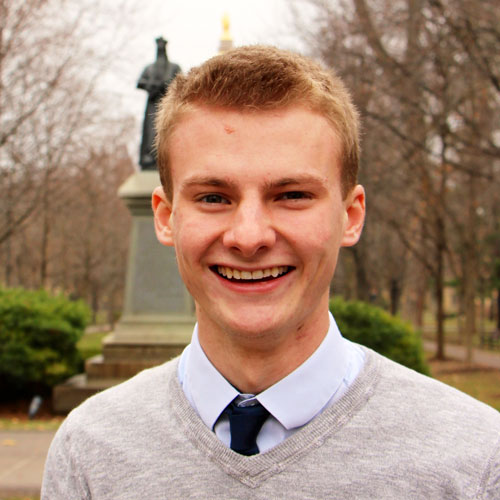Jake Bebar just wanted to make a lot of money. He entered the University of Notre Dame’s Mendoza School of Business as a finance major, not expecting his university peers and the local community to change his goals, his mindset, and his opinion of business.
Now a rising senior, his education has taken him for a ride. He’s left Mendoza, changed his major nine times, devoted himself to combating local poverty, branched into tackling poverty abroad, and ultimately returned to Mendoza to study management consulting.
His new ambitions were piqued when he met fellow Mendoza student Peter Woo. Bebar helped Woo found the Jubilee Initiative for Financial Inclusion (JIFFI), a microfinance institution that works to protect the economically struggling from potentially devastating payday loans.
Exposed to the local community outside what he calls the Notre Dame bubble, where dorm life comes with food and utilities, Bebar began to focus his education on service instead of moneymaking. He left the business school for the College of Arts and Letters, planning to move into full-time service work upon graduation.
Everything changed again, however, after he spent a summer in Nicaragua. He was volunteering at an orphanage, where he thought he would teach English, help out with manual labor, and play with children. Instead, he transformed their finances.
He took over management of the orphanage marketing and development campaign, put into place social media avenues for emergency funding, and proved to himself that the skills he learned at Mendoza could be useful in his new pursuits.
Returning to Notre Dame at the end of the summer, he re-enrolled in the Mendoza School, worked again with JIFFI and realized where his journey had been taking him: back to business, but business of a different kind.
Here’s his story:
I got to Notre Dame my freshman year and I met this guy, Peter Woo. He was talking all about financial inclusion, predatory lending, the APR, and basically a bunch of terms that I did not understand at all. I realized that he wanted to make an impact on the community in a good way, though, so I decided to join him. We helped start this microfinance institution, JIFFI, which gives out microfinance loans to consumers in the south-side community. These are people wouldn’t have access to loans for emergencies, like a transmission breaking down in their car or a heater in their house breaking down. We once funded a trip to Belize so that one man could visit his dying father, so really there’s a bunch of different situations, but we basically try to give credit to people who would usually not be able to receive credit.
The payday loan industry – how it works is if you needed access to capital, you would get a payday loan, and then you would take out a loan for $400 to fix your car transmission, and two weeks later you would have to pay that $400 back with an additional fee of about $50. And if you’re living paycheck to paycheck, you’re not going to be able to afford that $450, so what the payday lender will say is “just pay the $50 now,” and you can just keep paying the $50. So you’re never really knocking down the principal at all, you’re only paying that interest payment.
It traps people in this awful cycle of poverty. And don’t get me wrong, the payday lending industry works for people who are middle class and who aren’t living paycheck to paycheck. So for some people it works – not all payday lenders are evil people. But they do take advantage of a lot of people in poverty, so we try to be an organization that works on bringing people out of poverty. There are a lot of nonprofits in America that help people manage poverty, and that’s definitely needed, like food pantries and homeless shelters, but what we have tried to focus on is getting people out. How do we empower them? How do we help them get out of that situation?












Questions about this article? Email us or leave a comment below.